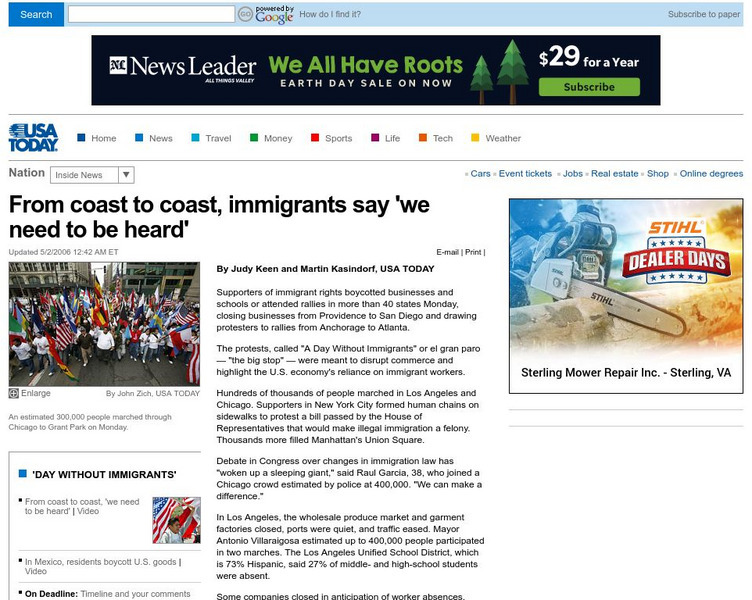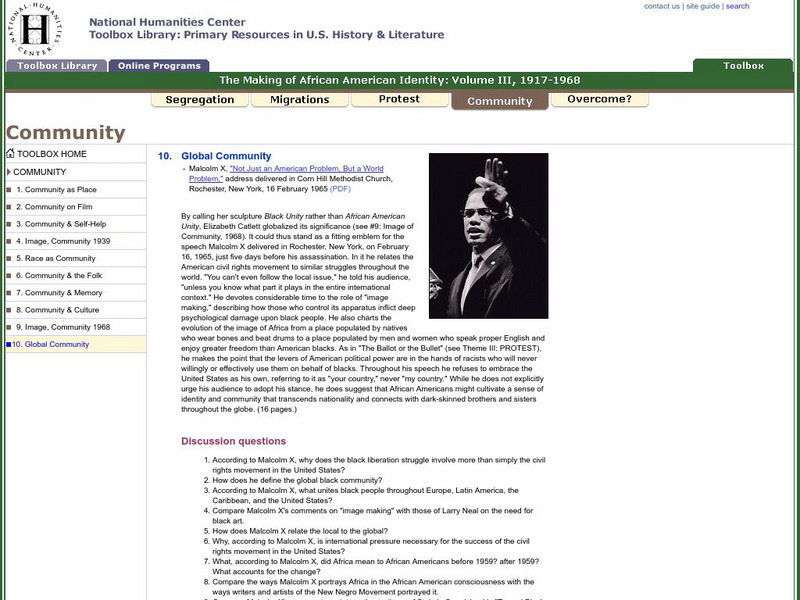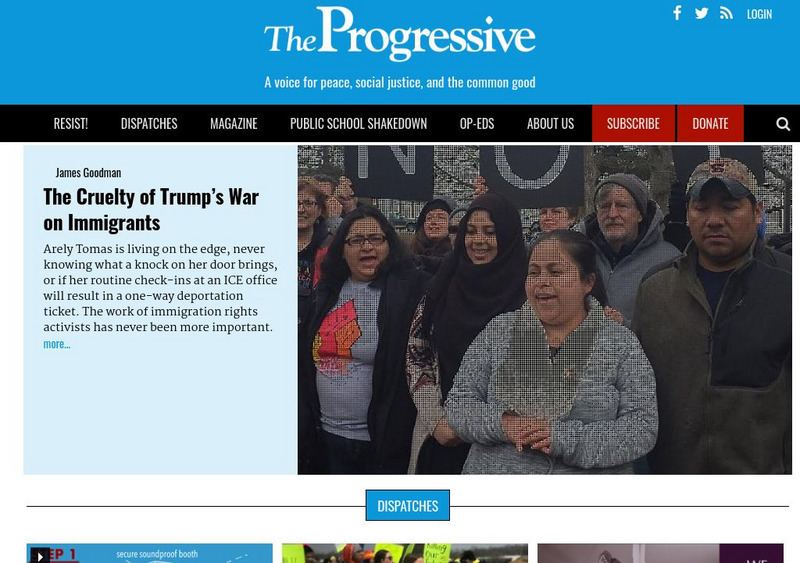Hi, what do you want to do?
BBC
Bbc News: Us Immigrants Stage Boycott Day
Detailed report of the May 1, 2006 protest against immigration law reform. Immigrants across the United States boycotted work to show their worth to America's economy. Provides links to a collection of stories about the immigration debate.
Other
The Heritage Foundation: Dr. Wang Dan, Student Leader in Tiananmen Square
Thoughts of Wang Dan, primary dissident in the Tiananmen Square protests, on China during the time of the protests and China in current times. June 2, 2009
Black Past
Black Past: Barnett, Ida Wells
This biography details the life and journalistic career of African American women's rights activist Ida B. Wells Barnett.
Houghton Mifflin Harcourt
Harcourt: Biographies: Martin Luther King, Jr. [In Spanish]
This resource offers a review of the life of this important man in the Civil Rights Movement. King believed in peaceful protests, instead of violence, to solve social problems. (In Spanish)
University of Groningen
American History: Outlines: The Native American Movement
Overview of the Native American push for Civil Rights in a post World War II America.
USA Today
Usa Today: Immigrants Say 'We Need to Be Heard'
Article describing the boycott of businesses and schools by immigrant rights supporters that took place on May 1, 2006. Discusses the impact of the protests nationwide. Links to other articles on immigration.
A&E Television
History.com: Martin Luther King, Jr.
Martin Luther King, Jr. was a social activist and Baptist minister who played a key role in the American civil rights movement from the mid-1950s until his assassination in 1968. King sought equality and human rights for African...
National Humanities Center
National Humanities Center: Toolbox Library: Global Community, Making of African American Identity: V. 3
On February 16, 1965, in Rochester, New York, Malcolm X delivered a speech that placed African American in a global black community. Just five days before his assassination, he relates the American civil rights movement to similar...
PBS
Pbs Learning Media: Decision in the Streets
Recounts the interracial Ad Hoc Committee to End Racial Discrimination's protests of racial inequality and unfair hiring practices in San Francisco in 1963-64.
Khan Academy
Khan Academy: Us History: 1980 Present: Continuity and Change in the Postwar Era
How much did the events of the tumultuous postwar era reshape American national identity? Kim discusses the extent to which developments like the Cold War, the Civil Rights Movement, Vietnam, and student protests of the 1960s changed...
iCivics
I Civics: Tinker v. Des Moines (1969)
This mini-lesson covers the basics of the Supreme Court's decision that extended First Amendment protections to students in the classroom. Students learn about the concept of symbolic speech and how students gained the right to engage in...
University of Groningen
American History: Outlines: Townshend Acts
Overview of the tax on goods imported to the colonies known as the Townshend Acts sparking protest in the colonies.
Steven Kreis, PhD
The History Guide: The Impact of Luther and the Radical Reformation
Review history with this site to see how Luther attracted a following to form Lutheranism. Learn how Luther's teaching came at the right time and made people leave the Roman Church. Understand that Luther preached peace and didn't...
Library of Congress
Loc: America's Story: 10 Suffragists Arrested, Picketing
Wives, mothers, and grandmothers were arrested outside the White House! Learn the circumstances behind this story in this 3 page article as they protested for the right to vote. Photographs and actual programs can be seen here.
Encyclopedia Britannica
Encyclopedia Britannica: 300 Women Who Changed History: Sarah Winnemucca
Encyclopedia Britannica provides a biography of Sarah Winnemucca, a Paiute Indian leader who protested the conditions found on Indian reservations in 1880.
Polk Brothers Foundation Center for Urban Education at DePaul University
De Paul University: Center for Urban Education: Dr. Martin Luther King, Jr. [Pdf]
"Dr. Martin Luther King, Jr." is a one page, biographical passage about Martin Luther King, Jr. It is followed by an open-ended question which requires students to provide evidence from the story; it includes determining the author's...
Other
The Progressive Magazine
Homepage of the national magazine for peace and social justice, THE PROGRESSIVE. Read recent news regarding social justice here.
Other
Labor Arts: Solidarity Forever: A Look at Wobbly Culture
An excellent collection of artifacts that highlight the aims and aspirations of the Industrial Workers of the World (IWW). Members of the IWW, known as Wobblies, played a unique role in the American labor movement. Artifacts include...
Other
Afscme: "I've Been to the Mountaintop" by Dr. Martin Luther King, Jr.
Learn about the the events of the 1968 Memphis Sanitation Workers Strike which drew Dr. Martin Luther King, Jr. to Memphis, which is where he was soon to be assassinated. Excellent source of primary sources and first hand accounts of the...
Other
Mlksb: Why We Honor Dr. Martin Luther King, Jr. Holiday
Learn why we honor Dr. Martin Luther King, Jr. with a holiday. Also gives a brief description on the life and work of Dr. King.
National Endowment for the Humanities
Neh: Edsit Ement: Revolution '67:What Happened in July 1967? How Do We Know?
In this lesson plan, middle schoolers learn about the riots in Newark, New Jersey, in 1967. Using primary sources, identify the causes of the disturbance in July, 1967. Links to the relevant information is provided.
The Newberry Library
Newberry Library: Library Exhibit: Outspoken: Chicago's Free Speech Tradition
A virtual library exhibit about free speech, focusing on the principles that unite Americans and the conflicts that divide them.
University of Virginia
Psychedelic 60s: Literary Tradition and Social Change
This exhibition is an attempt to revisit, share, and interpret the 60s.
University of Colorado
University of Colorado: American History and Film: Time Magazine the Generation Gap
These excerpts appeared in "Time Magazine" between 1967 and 1968 and reveal the country's frustration with the growing influence of the sixties counterculture.








![Harcourt: Biographies: Martin Luther King, Jr. [In Spanish] Website Harcourt: Biographies: Martin Luther King, Jr. [In Spanish] Website](https://content.lessonplanet.com/knovation/original/10579-732be41f1c9d4b23ab8a4e47a2cd1392.jpg?1661188540)











